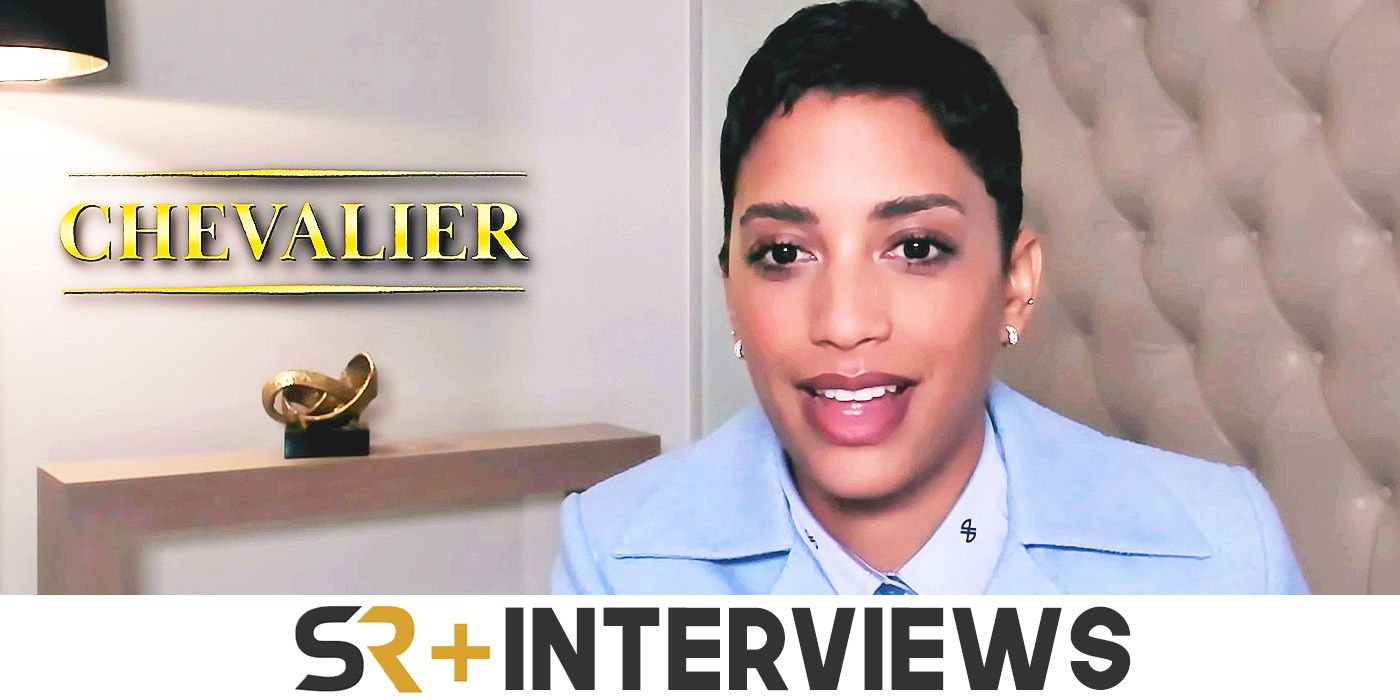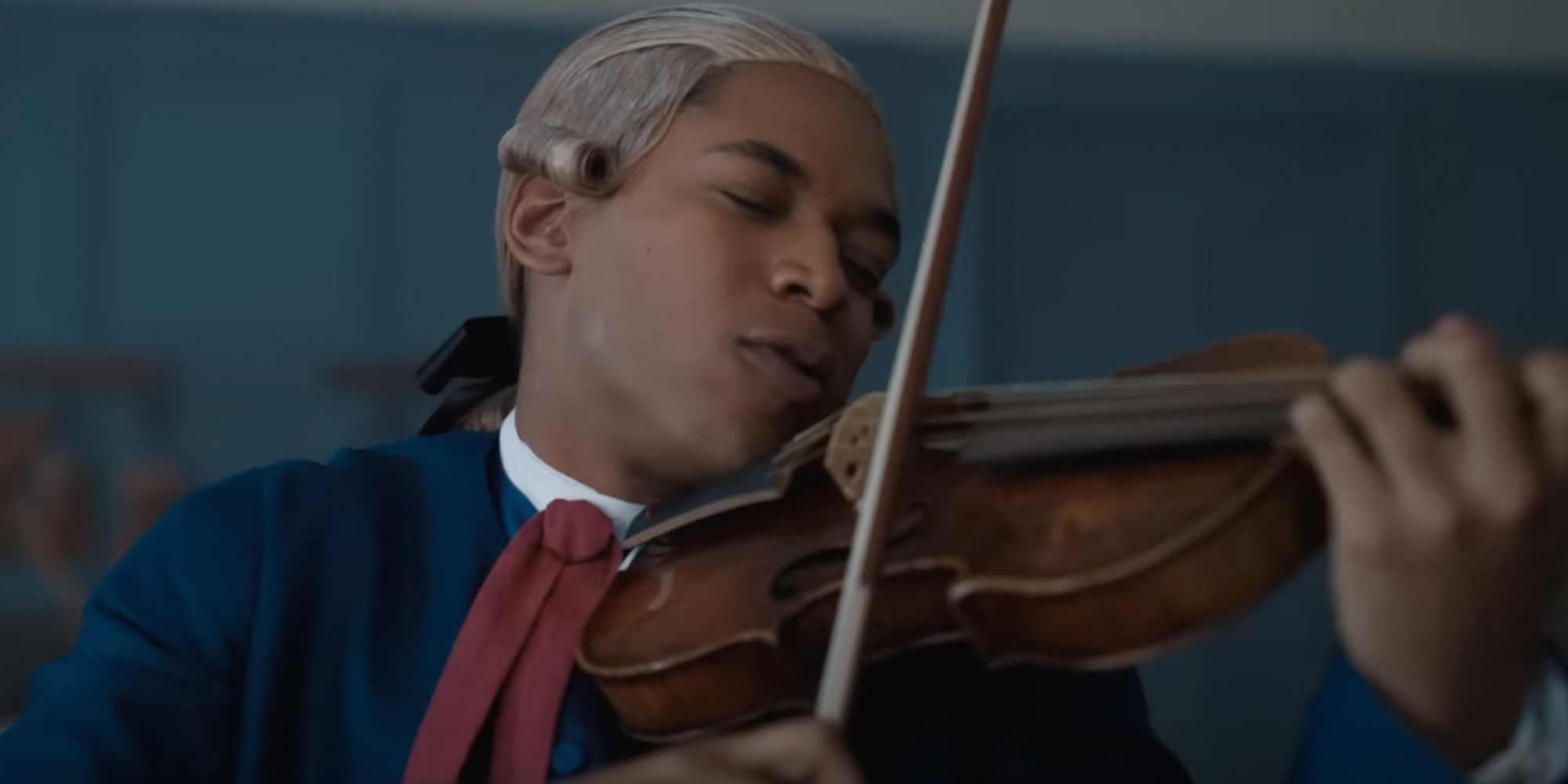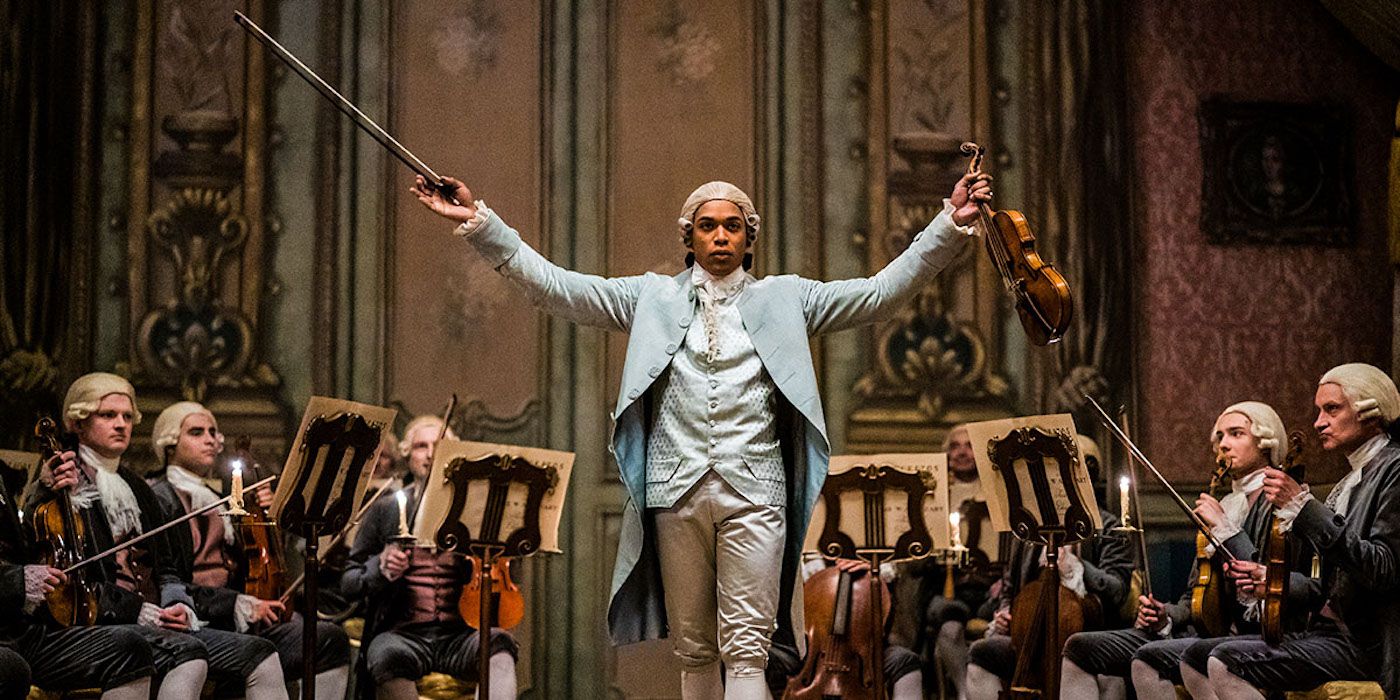The film Chevalier is a much-needed exploration into the life of Joseph Bologne, Chevalier de Saint-Georges. Bologne was a prodigious fencer, violinist, and composer, and rose in the court of Marie Antoinette after being born to a 16-year-old enslaved woman and taken to France. Bologne’s story is an incredible one, but after an attempt by none other than Napoleon Bonaparte to destroy the Chevalier’s work, much of it has been lost to history. Writer Stefani Robinson aims to change this with Chevalier, which tells the story of one of many pivotal times in Joseph Bologne’s life.
While Chevalier is Stefani Robinson’s first foray into film, she has already established herself as a standout television writer and producer. Robinson’s first major step into the film and TV industry was as a staff writer on Atlanta before adding one of the best mockumentary TV shows ever, What We Do in the Shadows, to her resume. With Chevalier, Robinson continues to showcase her ability to write characters and stories in a way that is both relevant and deeply relatable.
Stefani Robinson spoke with Screen Rant about discovering the Chevalier at a young age, the amount of work that went into crafting this film, and more.
Stefani Robinson on Chevalier
Screen Rant: You first heard about the Chevalier when you were a teenager. How did you first find out about him, and what was the thing that made you want to write this story?
Stefani Robinson: My mom gave me a book. I couldn’t even tell you what book it was. I just remember reading a paragraph; in my memory, it was sort of like a little blurb that was comprehensive enough in whetting my appetite or telling me who this person was. The thing that attracted me to him was just his life.
I’m pretty sure it was John Adams [who] said that Joseph Bologne was one of the most accomplished men in Europe, and it was true. This guy was a master fencer, he was a master horseback rider, [he] knew multiple languages, [and he] was a bit of a romancer. Obviously, [he] was incredibly gifted with a violin, and with composition, and with writing operas. He popularized the quartet. Then, later in life, [he] went and became a soldier in a revolution.
This man lived 20 lives in one, and to me, I think the astonishing thing was that it just sort of felt like a movie; he felt like [he was] a movie character, and wasn’t real. But I think I was more like, “Oh my gosh. How does everyone not know about this person? How am I not taught about this person in school?” A couple of years prior, I had been in an orchestra, and I played the cello. In conjunction with actually learning our instruments, we were taught the history of classical music, and taught at length about Mozart and Beethoven and their contributions. Joseph was just never part of those conversations, so I think it felt a little shortchanged, like it was someone’s responsibility to teach me about this person, and no one did, and I just sort of stumbled upon them.
You and Stephen both said you didn’t want to do a cradle-to-the-grave story, but Joseph Bologne’s life was so fascinating before and after the events in this movie. How did you choose where to pick up and end the story?
Stefani Robinson: If I had enough budget, and time, and resources, I would do the Joseph limited series. It would go on for seasons. It wouldn’t even be limited; it would be unlimited.
I think the thing while looking at his life [was] wanting to access the story from a personal perspective. Because so much of it is so incredibly amazing, I wanted to tell the story from a perspective that also felt personal to me. That’s probably the way that I felt like I could do it the most justice. I think the thing that was sticking in my brain was, like, “Okay, this is someone who was really close with the monarchy, and really chummy and friendly with Marie Antoinette, and [who had] lots of wealth, and [was] hanging out at Versailles, and [who], later in his life, was taking up arms against them.”
That, to me, was interesting. It’s like, “How do you go from literally walking shoulder-to-shoulder with these people, and then finding yourself compelled enough to actually fight against them? Something must have happened there, and there had to have been an ideological shift.” And I think that aspect was the most interesting thing. That coming into awareness, and coming into yourself, and learning about yourself, and discovering your identity through your creativity, [and] your responsibility to that creativity, was something that I think, on a [much, much] smaller scale, I probably was wrestling with at the time as well.
I’ve heard screenwriters talk about how TV writers tend to have a lot more agency over the end result than feature writers, because directors are such a big factor. As someone who’s done all TV work until now, how was jumping into film for you as a writer?
Stefani Robinson: I think it was great. It’s different. The thing that you just pointed out, that’s the truth. The film industry is sort of built on the director and their vision, and I think largely, historically, writers have been marginalized in that world. I mean that with a lot of love and affection, but that’s just sort of the truth. Screenwriters have been replaceable, and swapped out, and I’ve seen it happen. It’s a completely different world, but at the same time, not completely different at all.
[In] walking into this experience, I think the expectation from some people was that maybe I wouldn’t be so involved because I [was] just the writer and I was going pass it off. Luckily Stephen comes from TV as well. We were two people who are coming from TV; we only know collaboration. That’s just the only way we know how to work.
I have been so lucky in television to have agency over my scripts, but in a collaborative way. I share the script. Working with directors like Hiro Murai on Atlanta, or Yana Gorskaya or Kyle Newacheck, or Taika (Waititi) on What We Do in the Shadows [was] an incredibly collaborative experience. You just don’t really know where the script or the direction ends, and you’re having conversations constantly, and you’re constantly ping-ponging one another.
That is what I know, and that’s how I like to work, and that’s how Stephen likes to work too, because that’s how he’s worked. Long story short, that’s how we came into this experience: being very vocal, and very adamant, and intentional about the partnership that we wanted to have. It was him and I until the very end protecting each other, honestly. He was an incredible partner, [and was] incredibly gracious in sharing all of that experience with me.
This was the [highest number of] drafts you’ve ever done of anything. What was the hardest thing to get right, and how big were the changes from draft to draft?
Stefani Robinson: Oh, my gosh. Sometimes it would be as tiny as re-ordering a few scenes, and sometimes it would be as big as, like, “Okay. I guess that whole first act is completely different,” or “That character who was in every single page is now not there anymore.” It was really difficult.
I think that we got a lot right; that’s the thing. I don’t think that there were drafts upon drafts because things were wrong, I think it’s just studio notes. When you’re making a movie, there’s so much more discussion. I found it’s, again, very different from my experience in TV, and I’ve been very lucky in TV that I’ve had partners that support the scripts and take care of that kind of thing.
Searchlight was incredibly, incredibly gracious, and incredibly supportive, but it’s a completely different experience. They’re way more involved in different ways, and you’re balancing an incredibly larger budget, and there are a lot of moving parts. It’s just [that] the nature of films [is] different; therefore, [filmmaking] requires much more discussion and maneuvering.
Do you listen to music while you write, and if so, what did you listen to while you wrote this?
Stefani Robinson: That’s a great question. I do listen to music while I write. I listen to music, but I also put on movies. I mute movies that I like while I write and [choose] movies that I feel like I love and know very well. [I choose movies] I know backwards and front. I think I did more of that.
I put on Purple Rain a lot and muted it. As I was writing, I would look up and sort of start watching it for a bit. That movie had a cheekiness to it. It’s a ridiculous film; I love it. There’s a silliness and self-awareness about it that feels a little unconventional, and trying to inject some of that into the flavor of the contemporary field of Chevalier, I think, was important. Obviously, I put on Amadeus, or I put on Sofia Coppola’s Marie Antoinette just to truly immerse myself in the world, and the textures, and the feels, and the shots, and the staging. All of that was really helpful when writing, writing the movie, so more so that than music.
About Chevalier
Inspired by the incredible story of composer Joseph Bologne, Chevalier de Saint-Georges. The illegitimate son of an African slave and a French plantation owner, Bologne (Kelvin Harrison Jr. in a tour de force performance) rises to improbable heights in French society as a celebrated violinist-composer and fencer, complete with an ill-fated love affair and a falling out with Marie Antoinette (Lucy Boynton) and her court.
Check out our other Chevalier interviews:
Chevalier will be released in theaters on April 21st.



